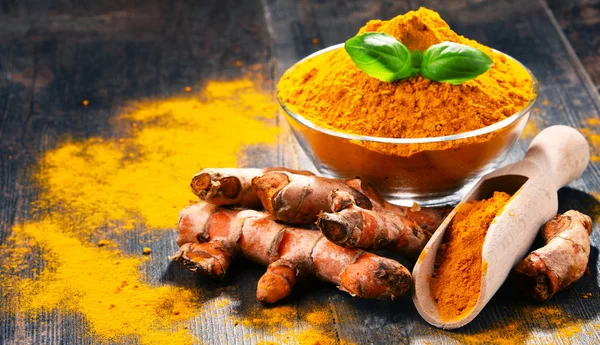Share this @internewscast.com
Discover “15 Reasons Cooking With Turmeric Powder Is Good” Turmeric, a vibrant yellow spice native to India, has been revered for centuries for its culinary and medicinal properties. Beyond its warm, earthy flavor, turmeric boasts an impressive array of health benefits, making it a valuable addition to any diet.
15 Reasons Cooking With Turmeric Powder Is Good
Turmeric powder is a rich source of curcumin, a compound with powerful anti-inflammatory and antioxidant properties. Here are 15 compelling reasons why incorporating turmeric powder into your cooking is a wise choice:

1. Reduces inflammation
Turmeric contains curcumin, a compound that has powerful anti-inflammatory properties. Curcumin has been shown to be effective in reducing inflammation in a number of conditions, including arthritis, heart disease, and cancer. A 2016 study published in the journal Arthritis Research & Therapy found that curcumin was just as effective as ibuprofen in reducing pain and inflammation in people with osteoarthritis of the knee.
2. Boosts antioxidant activity
Turmeric is a rich source of antioxidants, which help protect cells from damage caused by free radicals. Free radicals are unstable molecules that can contribute to aging and disease. A 2023 study published in the journal Oxidative Medicine and Cellular Longevity found that curcumin was able to protect cells from damage caused by oxidative stress.
3. Improves brain function
Turmeric’s neuroprotective effects have gained significant attention in recent years. Curcumin has been shown to improve brain function and protect against Alzheimer’s disease and dementia. Moroso, it has been shown to increase levels of brain-derived neurotrophic factor (BDNF), a protein that is important for learning and memory. A 2012 study published in the journal Alzheimer’s & Dementia found that curcumin was able to improve cognitive function in people with Alzheimer’s disease.
4. Protects against heart disease
Turmeric has been shown to protect against heart disease by reducing LDL (bad) cholesterol levels and increasing HDL (good) cholesterol levels. It also helps to prevent blood clots. A study published found that curcumin was able to reduce LDL cholesterol levels by 12% and increase HDL cholesterol levels by 27%.
5. May help prevent cancer
Turmeric’s anti-cancer properties are an area of active research. Curcumin has demonstrated the ability to suppress cancer cell growth, induce apoptosis (programmed cell death), and prevent cancer metastasis (spread). A 2017 study found that curcumin was able to kill colon cancer cells. While more research is needed, turmeric holds promise as a complementary therapy for cancer treatment.
6. Relieves arthritis pain
Turmeric is effective in relieving pain and inflammation caused by arthritis. A 2016 study found that curcumin was just as effective as ibuprofen in reducing pain and inflammation in people with osteoarthritis of the knee.
7. Improves wound healing
Turmeric’s ability to promote wound healing is attributed to its anti-inflammatory and collagen-boosting effects. Curcumin can accelerate the healing process by reducing inflammation and stimulating collagen production, leading to faster wound closure and improved skin regeneration. A study published in the journal BioMed Research International found that curcumin was able to accelerate wound healing in mice.
8. Boosts the immune system
Turmeric can strengthen the immune system by enhancing the activity of immune cells, such as white blood cells. This improved immune response helps the body fight off infections and diseases more effectively. A study published in the journal Phytomedicine found that curcumin was able to increase white blood cell production in mice.
9. Protects against liver damage
Turmeric’s protective effects on the liver are well-recognized. Curcumin can help prevent liver damage caused by toxins, alcohol, and other harmful substances. It can also reduce inflammation and promote liver regeneration. A study published in the journal World Journal of Gastroenterology found that curcumin was able to protect against liver damage caused by alcohol in mice.
10. Improves digestion
Turmeric has been shown to improve digestion by increasing bile production and reducing inflammation. One study published in the journal Phytomedicine found that curcumin was able to improve digestion in people with irritable bowel syndrome.
11. Enhances skin health
Turmeric has been shown to enhance skin health by reducing inflammation and preventing the formation of wrinkles. A 2016 study published in the journal Phytomedicine found that curcumin was able to reduce skin inflammation and improve skin elasticity in people with eczema.
12. Potential weight management aid
Some studies suggest that turmeric may aid in weight management. Curcumin may help regulate appetite, boost metabolism, and reduce fat accumulation. However, more research is needed to confirm these findings.
13. Supports Bone Health
Curcumin may help prevent bone loss and osteoporosis by increasing bone mineral density. It may also reduce inflammation associated with arthritis.
14. Reduces Depression Symptoms
Curcumin may have antidepressant effects by increasing levels of serotonin and dopamine, neurotransmitters that regulate mood. Studies suggest that curcumin may be as effective as some antidepressants.
15. Helps Manage Blood Sugar Levels
Turmeric may help regulate blood sugar levels and improve insulin sensitivity, potentially benefiting individuals with diabetes.
These are just a few of the many reasons why cooking with turmeric powder is good for you. Turmeric is a versatile spice that can be added to a variety of dishes, including smoothies, soups, stews, and curries. You can also take turmeric supplements in capsule form. If you have read to this point, we appreciate you and would recommend you read, Eating Salmon Fish: Is It Helpful for Weight Loss?
How much turmeric should I use?
The amount of turmeric you should use depends on your personal preference and the dish you are making. A general recommendation is to start with 1/2 teaspoon of turmeric powder and add more to taste. Turmeric goes well with a variety of spices, including ginger, garlic, black pepper, cumin, and coriander.
Here are some turmeric diet recipes to try:
- The Golden Milk Diet: This diet involves drinking a golden milk latte every day. Golden milk is a warm beverage made with turmeric, ginger, black pepper, and milk. The black pepper helps to increase the bioavailability of curcumin, which means that your body can absorb it more easily.
- The Turmeric Rice Diet: This diet involves eating turmeric rice with every meal. Turmeric rice is made by adding turmeric powder to cooked rice. You can also add other spices, such as ginger, garlic, and cumin, to the rice.
- The Turmeric Smoothie Diet: This diet involves drinking a turmeric smoothie every day. Turmeric smoothies are made with turmeric powder, fruit, and yogurt. You can also add other ingredients, such as spinach, kale, and almond milk, to the smoothies.
No matter which turmeric diet you choose, be sure to talk to your doctor before starting. Turmeric is a safe spice for most people, but it can interact with some medications.
Incorporating Turmeric into Your Diet
Turmeric’s versatility in culinary applications makes it easy to incorporate into your diet. Here are some ways to enjoy turmeric’s flavor and benefits:
-
Add turmeric powder to smoothies, curries, soups, stews, and roasted vegetables.
-
Make turmeric tea by boiling turmeric powder in water and adding honey or lemon for taste.
-
Incorporate turmeric into your morning routine with a turmeric latte.
-
Use turmeric supplements under the guidance of a healthcare professional.
Turmeric, with its rich history, vibrant color, and remarkable health benefits, has emerged as a culinary and wellness treasure. Its versatility in cooking and its potential therapeutic effects make it a valuable addition to one’s lifestyle. As research continues to explore the depths of turmeric’s benefits, its reputation as a golden spice










